Readings Newsletter
Become a Readings Member to make your shopping experience even easier.
Sign in or sign up for free!
You’re not far away from qualifying for FREE standard shipping within Australia
You’ve qualified for FREE standard shipping within Australia
The cart is loading…






This title is printed to order. This book may have been self-published. If so, we cannot guarantee the quality of the content. In the main most books will have gone through the editing process however some may not. We therefore suggest that you be aware of this before ordering this book. If in doubt check either the author or publisher’s details as we are unable to accept any returns unless they are faulty. Please contact us if you have any questions.
Since the end of World War II Germany and Berlin, in particular, have pro vided the Soviet Union with convenient points on which to apply pressure upon the West. In September 1955 the Russians formally terminated the occupation status of their zone and recognized the sovereignty of the German Democratic Republic , but in doing so they reserved to the Soviet Army control over the movement of British, French, and American military personnel and freight between West Berlin and the Federal German Re public which the Western Big Three had recognized as a sovereign state in 1954* In September 1958 the Soviet Union began exerting new pressure upon the West to alter the status of Berlin and Germany. Its initial moves sug gested the Russians were primarily interested in concluding a peace treaty with a divided Germany and making West Berlin a so-called free city- unilaterally if need be - by the end of May 1959. However, intensive diplomatic maneuvering on both sides soon revealed the Russian position to be more flexible than originally indicated and one of its primary goals to be the calling of a summit conference which the Soviet Union had sought since 1956. Shortly before the expiration of N. S. Khrushchov’s November 27, 1958, six-month ultimatum, the Big Four had reached sufficient agreement to convene a Foreign Ministers’ Conference. However, after three months of fruitless negotiations it produced only deadlock.
$9.00 standard shipping within Australia
FREE standard shipping within Australia for orders over $100.00
Express & International shipping calculated at checkout
This title is printed to order. This book may have been self-published. If so, we cannot guarantee the quality of the content. In the main most books will have gone through the editing process however some may not. We therefore suggest that you be aware of this before ordering this book. If in doubt check either the author or publisher’s details as we are unable to accept any returns unless they are faulty. Please contact us if you have any questions.
Since the end of World War II Germany and Berlin, in particular, have pro vided the Soviet Union with convenient points on which to apply pressure upon the West. In September 1955 the Russians formally terminated the occupation status of their zone and recognized the sovereignty of the German Democratic Republic , but in doing so they reserved to the Soviet Army control over the movement of British, French, and American military personnel and freight between West Berlin and the Federal German Re public which the Western Big Three had recognized as a sovereign state in 1954* In September 1958 the Soviet Union began exerting new pressure upon the West to alter the status of Berlin and Germany. Its initial moves sug gested the Russians were primarily interested in concluding a peace treaty with a divided Germany and making West Berlin a so-called free city- unilaterally if need be - by the end of May 1959. However, intensive diplomatic maneuvering on both sides soon revealed the Russian position to be more flexible than originally indicated and one of its primary goals to be the calling of a summit conference which the Soviet Union had sought since 1956. Shortly before the expiration of N. S. Khrushchov’s November 27, 1958, six-month ultimatum, the Big Four had reached sufficient agreement to convene a Foreign Ministers’ Conference. However, after three months of fruitless negotiations it produced only deadlock.